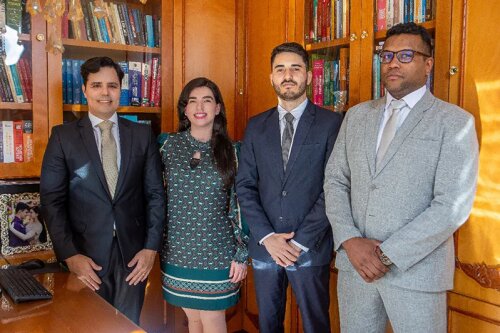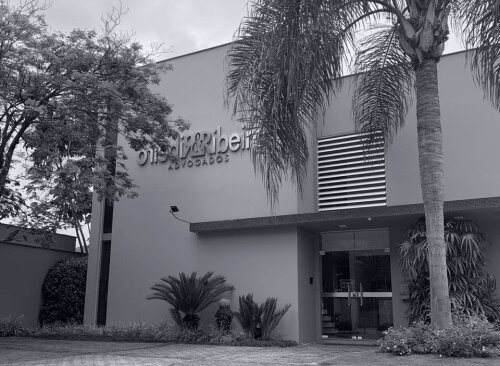Best Sports Law Lawyers in Brazil
Share your needs with us, get contacted by law firms.
Free. Takes 2 min.
Or refine your search by selecting a city:
List of the best lawyers in Brazil
About Sports Law in Brazil
Sports Law in Brazil is a dynamic and evolving field that intersects with multiple legal disciplines. It is designed to oversee the conduct and organization of sports activities, covering issues such as employment contracts, governance, anti-doping regulations, intellectual property rights, and dispute resolution. Given Brazil's passion for sports, especially football, Sports Law holds significant importance both legally and culturally.
Why You May Need a Lawyer
There are several situations where individuals and organizations may require legal assistance in Sports Law. Athletes often need advice on contract negotiations and endorsements, clubs may need guidance on compliance with national and international regulations, and sports agents require knowledge of ethical standards and legal obligations. Additionally, issues such as doping allegations, governance disputes, and intellectual property rights in merchandising products necessitate expert legal advice.
Local Laws Overview
Sports Law in Brazil is influenced by national legislation such as the Pelé Law, which regulates the operation of sports entities, athletes’ contracts, and athlete's rights. Brazil also adheres to international regulations set forth by bodies like FIFA, IOC, and WADA. The country has a unique legal environment for sports, ensuring protection against discrimination, supporting athletes' representations, and maintaining a fair play approach.
Frequently Asked Questions
What is the Pelé Law?
The Pelé Law is the foundational legislation in Brazil that governs sports entities, athlete contracts, and their working conditions. It emphasizes the rights of athletes, establishing principles for fair compensation and freedom of employment.
What legal protections do Brazilian athletes have?
Brazilian athletes are protected under several laws including the Pelé Law, which ensures rights like fair wage negotiation, access to social security benefits, and the ability to freely change clubs at the end of contracts.
How are disputes resolved in Brazilian sports?
Disputes in sports are resolved through various mechanisms including arbitration, mediation, and judicial processes. The STJD (Superior Tribunal of Sports Justice) plays a critical role in settling sports-related disputes.
What are the regulations regarding doping in Brazil?
Brazil complies with international anti-doping standards implemented by WADA and has established its own anti-doping agency (ABCD) to enforce compliance, testing, and education programs.
How is intellectual property handled in sports in Brazil?
Intellectual property in sports covers trademarks, image rights, and broadcasting rights. Brazilian law protects these IP rights, ensuring entities and athletes can exploit their commercial potential legally.
What is the role of sports agents in Brazil?
Sports agents in Brazil facilitate negotiations and contracts for athletes. They must operate within ethical and legal standards as prescribed by national and sometimes international regulations.
Can foreign athletes work in Brazil easily?
Foreign athletes can work in Brazil but require appropriate work visas and must adhere to Brazilian contract and labor laws suitable for their specific sports.
What happens if a sports contract is breached in Brazil?
Breaches of contracts can lead to legal action, including claims for damages or penalties as specified in the contract. Dispute resolution can occur through arbitration or courts, depending on the agreement terms.
How does Brazilian law treat sports injuries?
Sports injuries are considered occupational risks, and athletes are entitled to treatment and compensation under labor laws and specific provisions in the Pelé Law.
How are Brazilian sports entities regulated?
Sports entities in Brazil are regulated by national laws such as the Pelé Law, which governs their organization, compliance with sports governance, and financial transparency among other aspects.
Additional Resources
For additional information on Sports Law in Brazil, individuals can reach out to:
- ABCD: The Brazilian Anti-Doping Authority provides resources on anti-doping regulations.
- Confederação Brasileira de Futebol (CBF): Governs football and can provide regulations pertinent to the sport.
- Ministry of Sports: Offers guidelines for compliance in various sports sectors.
- STJD: Provides research material and case law on sports justice in Brazil.
Next Steps
If you need legal assistance in Sports Law in Brazil, consider the following steps:
- Consult a Specialist: Seek advice from a lawyer specializing in Sports Law to understand your rights and obligations.
- Gather Information: Collect relevant contracts, agreements, and documentation pertinent to your case.
- Engage a Law Firm: Consider hiring a law firm with expertise in representing athletes, clubs, or other sports-related entities.
- Prepare for Resolution: Be ready for arbitration or litigation and discuss possible outcomes with your legal advisor.
Lawzana helps you find the best lawyers and law firms in Brazil through a curated and pre-screened list of qualified legal professionals. Our platform offers rankings and detailed profiles of attorneys and law firms, allowing you to compare based on practice areas, including Sports Law, experience, and client feedback.
Each profile includes a description of the firm's areas of practice, client reviews, team members and partners, year of establishment, spoken languages, office locations, contact information, social media presence, and any published articles or resources. Most firms on our platform speak English and are experienced in both local and international legal matters.
Get a quote from top-rated law firms in Brazil — quickly, securely, and without unnecessary hassle.
Disclaimer:
The information provided on this page is for general informational purposes only and does not constitute legal advice. While we strive to ensure the accuracy and relevance of the content, legal information may change over time, and interpretations of the law can vary. You should always consult with a qualified legal professional for advice specific to your situation.
We disclaim all liability for actions taken or not taken based on the content of this page. If you believe any information is incorrect or outdated, please contact us, and we will review and update it where appropriate.
Browse sports law law firms by city in Brazil
Refine your search by selecting a city.














